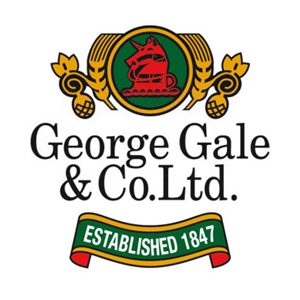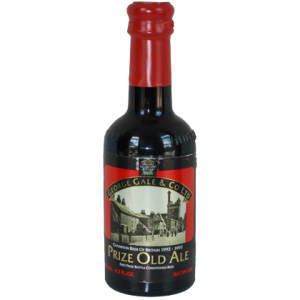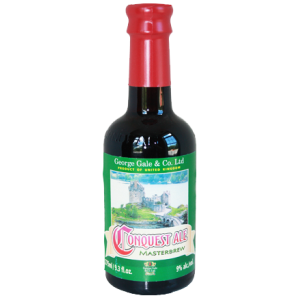During the eighteenth and early nineteenth centuries, Horndean was a ribbon community astride the busy road linking London with the country's premier naval and military town, Portsmouth.
From the eighteenth century, the Gale family was contributing to Horndean's commercial life via their activities as Grocers and Bakers. Richard Gale (born in 1802) succeeded his mother Ann in this capacity, branching out to develop a second occupation as Coal and Corn Merchant before acquiring, in 1847, the Ship & Bell Inn, already renowned for its beer.
By 1853, Richard's son George Alexander was running the premises for him. Like most commercial inns of the that time, the Ship & Bell had its own brewery and within a short time, George Alexander decided that the potential for expansion was considerable.
A fire destroyed the first brewery, however a new one was built mainly using the remains of the old one. Much of the new plant, including the brewing tower, forms the premises that visitors can still see today.
George Alexander Gale continued to expand the brewery business until in 1888 he registered as a limited company.
By 1896, George Gale sold his major shareholding and the chairmanship passed to Herbert Frederick Bowyer, a miller from Guildford. The area of commercial influence then widened into Sussex where, the company acquired the Angel brewery. Subsequently, Gales continued to expand into Berkshire, Oxfordshire, Wiltshire, Surrey.
Success had much to do with a now stable workforce which pulled together, the rise of Gales bottled beer output, new modes of transport, but above all, the excellent quality of Gales beers. Every other year, from 1902 to 1908, Gales won prizes at the Brewer's Exhibitions.
For the British brewing industry the First World War was regarded as a disasterm with beer duties raised by over 400 per cent, output restricted, beer strength reduced, quality lowered and raw material prices raised. Gales though proved resilient, and the Company excaped relatively unscathed.
After the war, Gales trophy cabinet continued to overflow, winning awards at the Brewer's Exhibition every year from 1923 to 1926 inclusive as well as in 1928 and 1930. Was there any wonder that they continued to increases sales of their five cask beers and eight bottled beers.
Because of aerial warfare the Second World War had a more direct impact on the civilian population. Gales had a number of houses damaged by Lufwaffe raids and petrol and transport shortages meant resorting to horse-drawn vehicles for the first time since 1929. However, despite this, and with strict rationing limiting the opportunities to spend, the pub became re-established as a centre of leisure.
Gales had survived a World War again, but could they survive the post war slump? By 1949 output had fallen 40 per cent, and profits fell even more dramatically to under 4,000 pounds. It was clearly a time for much concern.
1959 was a time of rapid change, and marked the beginnings of Gales recovery, as along with new machinery, Gales first introduced Horndean Special Bitter (HSB).
The resulting flavour has earned HSB a national reputation as one of the classic high strngth bitters of England and helped spear-head a Gales revivial.
When the then chairman, Hugh Bowyer, died in 1982, it brought to and end another chapter in Gales history. Taking over at an inauspicious time, he had seen the company through a World War when new heights were achieved, followed by fifteen years of decline, to finally, a recovery to quite exceptional new levels of output and profit. When he died, he left Gales in a stronger position than ever before.
Gales retained the title of Pub Company of the Year at the Publican awards, the success again highlights how Gales has never allowed itself to become complacent and above all innovative enough to stay ahead of the chasing pack.
This strength is seen as a major quality in the industry, so much so that the London Independent family brewers Fuller, Smith & Turner (brewers of London Pride) made a surprise bid and acquired Gales in a 92 million pound deal. It ended Gales 158 year old independence, but will allow the Gales heritage to be further enjoyed by a much wider audience for years to come.
From the eighteenth century, the Gale family was contributing to Horndean's commercial life via their activities as Grocers and Bakers. Richard Gale (born in 1802) succeeded his mother Ann in this capacity, branching out to develop a second occupation as Coal and Corn Merchant before acquiring, in 1847, the Ship & Bell Inn, already renowned for its beer.
By 1853, Richard's son George Alexander was running the premises for him. Like most commercial inns of the that time, the Ship & Bell had its own brewery and within a short time, George Alexander decided that the potential for expansion was considerable.
A fire destroyed the first brewery, however a new one was built mainly using the remains of the old one. Much of the new plant, including the brewing tower, forms the premises that visitors can still see today.
George Alexander Gale continued to expand the brewery business until in 1888 he registered as a limited company.
By 1896, George Gale sold his major shareholding and the chairmanship passed to Herbert Frederick Bowyer, a miller from Guildford. The area of commercial influence then widened into Sussex where, the company acquired the Angel brewery. Subsequently, Gales continued to expand into Berkshire, Oxfordshire, Wiltshire, Surrey.
Success had much to do with a now stable workforce which pulled together, the rise of Gales bottled beer output, new modes of transport, but above all, the excellent quality of Gales beers. Every other year, from 1902 to 1908, Gales won prizes at the Brewer's Exhibitions.
For the British brewing industry the First World War was regarded as a disasterm with beer duties raised by over 400 per cent, output restricted, beer strength reduced, quality lowered and raw material prices raised. Gales though proved resilient, and the Company excaped relatively unscathed.
After the war, Gales trophy cabinet continued to overflow, winning awards at the Brewer's Exhibition every year from 1923 to 1926 inclusive as well as in 1928 and 1930. Was there any wonder that they continued to increases sales of their five cask beers and eight bottled beers.
Because of aerial warfare the Second World War had a more direct impact on the civilian population. Gales had a number of houses damaged by Lufwaffe raids and petrol and transport shortages meant resorting to horse-drawn vehicles for the first time since 1929. However, despite this, and with strict rationing limiting the opportunities to spend, the pub became re-established as a centre of leisure.
Gales had survived a World War again, but could they survive the post war slump? By 1949 output had fallen 40 per cent, and profits fell even more dramatically to under 4,000 pounds. It was clearly a time for much concern.
1959 was a time of rapid change, and marked the beginnings of Gales recovery, as along with new machinery, Gales first introduced Horndean Special Bitter (HSB).
The resulting flavour has earned HSB a national reputation as one of the classic high strngth bitters of England and helped spear-head a Gales revivial.
When the then chairman, Hugh Bowyer, died in 1982, it brought to and end another chapter in Gales history. Taking over at an inauspicious time, he had seen the company through a World War when new heights were achieved, followed by fifteen years of decline, to finally, a recovery to quite exceptional new levels of output and profit. When he died, he left Gales in a stronger position than ever before.
Gales retained the title of Pub Company of the Year at the Publican awards, the success again highlights how Gales has never allowed itself to become complacent and above all innovative enough to stay ahead of the chasing pack.
This strength is seen as a major quality in the industry, so much so that the London Independent family brewers Fuller, Smith & Turner (brewers of London Pride) made a surprise bid and acquired Gales in a 92 million pound deal. It ended Gales 158 year old independence, but will allow the Gales heritage to be further enjoyed by a much wider audience for years to come.
There are no reviews for this item.




